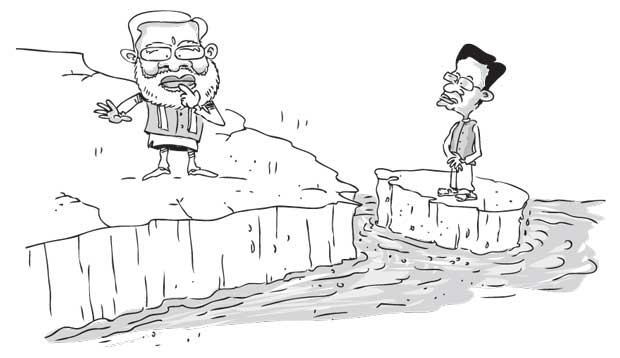Reply To:
Name - Reply Comment

The Northern Provincial Council (NPC) passed a strongly worded resolution accusing successive governments in the island nation of committing ‘genocide’ against Tamils. The document details ‘episodes of violence and oppression’ (according to the TNA of course), beginning with the language legislation in 1956 and ending with the final phase of the battle which saw the LTTE being militarily crushed. The resolution has also been forwarded to the UN High Commissioner for Human Rights with a request that it recommends appropriate prosecution.
The NPC has the freedom to pass resolutions. One might wish that the NPC, especially with a learned judge as its Chief Minister, would be more circumspect in the use of language, for example framing the resolution with the word ‘genocide,’ but wisdom is sometimes a victim of political prerogatives that are unwholesome.
‘Genocide’ refers to ‘the deliberate killing of a large group of people, especially those of a particular nation or ethnic group’. Politically, its use makes perfect sense since the appeal, in part, is to a West-controlled multilateral body.
These countries associate the word with the holocaust (a word that the West uses almost exclusively to describe what Hitler’s Germany did to the Jews, never mind the fact that larger numbers were killed in the war games played by these very same nations, before and after the Second World War). In advertising circles it would be called ‘Top of the mind communication’. When those in Geneva read ‘genocide’ graphics and widely circulated images of the ‘holocaust’ which would flood their minds. Perfect.
On the positive side, Chief Minister Wigneswaran has said that the resolution is ‘a challenge to the moral integrity and humaneness of the Sinhalese majority,’ a community he referred to as his ‘brothers and sisters’.
Indeed it cannot be anything but good and wholesome for any community to reflect long and hard on its collective moral integrity and humanness especially with respect to relations with other communities.
The problem with Wigneswaran’s ‘challenge’ is that it is one that comes not only with debatable and even tendentious claims but can be thrown back at the very community whose grievances the Chief Minister seeks to articulate. The Tamil National Alliance (TNA), the party in control of the NPC, after all, stated in no uncertain terms that the LTTE were the sole representatives of the Tamil people.
All this, however, is a throwback to decades-long bickering between Sinhala and Tamil nationalist forces, especially their most extreme voices. That is what is most disturbing about this resolution. It would seem that the NPC, clearly not unaware of the fact that no hands are untainted and that the Sinhalese and Muslims suffered at the hands of Tamils and that the LTTE did no favors to the Tamils themselves.
Had the NPC stood by the adage ‘charity begins at home’ then and then alone would the appeal to Sinhala humaneness and moral integrity find resonance in that community. Upping the ante will not win friends.
Humanness aside ‘moral integrity’ will raise issues of relative morality. Pot-kettle-blackness assessment never makes for reconciliation. It only hardens stances. Humanness quickly slips into footnote and end note territory or is abandoned altogether. We know where it all took us over the past 30 years and where it ‘ended’. Re-inventing the wheel of hostility does not enable comfortable travelling into a better tomorrow.
This does not mean that revisiting the past is not useful. It is important. Lessons have to be learnt. Demagoguery, history has shown, puts a full stop to learning. This is not a resolution, therefore, that helps the resolution of antagonism.